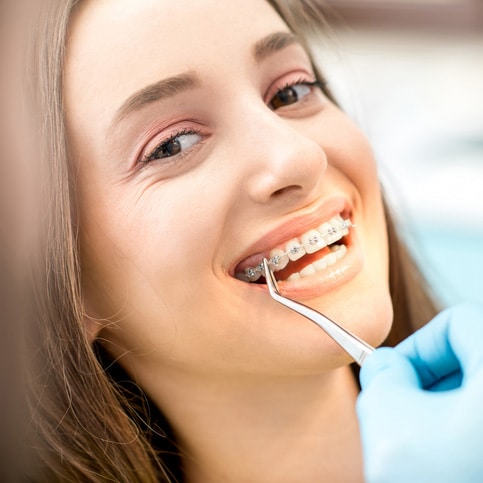All About Braces Care and Oral Hygiene
Braces are a significant step toward a healthier, more confident smile, but they do require a little extra care. To ensure you get the best results, keeping your teeth, braces, and gums clean is essential throughout your treatment.
Brushing with Braces
To prevent plaque buildup and maintain optimal oral health, brushing your teeth becomes even more important when you have braces. Plaque and food particles can easily get trapped around your brackets and wires, so thorough cleaning is key.
Brush after every meal: Use a soft-bristled toothbrush and fluoride toothpaste. Move your brush in small, circular motions to remove food particles that may have accumulated between your braces and teeth.
How to Brush: Make sure you brush all areas of your teeth, including the front, back, and chewing surfaces. Don’t forget to brush your tongue and the roof of your mouth.
Brush four times daily: Once in the morning, after lunch, after dinner, and before bed.
Replace your toothbrush often: Your toothbrush will wear down faster due to the braces, so be sure to replace it when the bristles start to fray.
Extra Tip: Consider adding an antibacterial mouthwash and fluoride rinse to your routine for better protection against plaque and bacteria.
Flossing with Braces
Flossing is an essential step for keeping your teeth healthy during orthodontic treatment. A regular toothbrush can’t always reach the spaces between your teeth, especially around brackets and wires.
Use a floss threader: If you’re using braces, we provide a reusable floss threader to help you floss between your archwire and your teeth.
Floss daily: Take your time and carefully slide the floss between your teeth and under your archwire to ensure you’re getting rid of any plaque buildup. You may notice some bleeding in the first few days, but if it continues, consult with us at your next visit.
Flossing tip: Always floss at night before bed, so your teeth are clean as you sleep.
Eating with Braces
Your diet plays a significant role in your orthodontic journey. While you won’t need to avoid all your favorite foods, certain types of food can damage your braces or cause unnecessary delays in your treatment.
Right after getting braces: Stick to soft foods like mashed potatoes, yogurt, soup, and scrambled eggs to minimize discomfort and allow your mouth to adjust.
Foods to Avoid:
Sticky foods like gum, licorice, caramels, and toffee can get stuck in your braces and cause tooth decay.
Hard foods such as ice, nuts, raw carrots, and corn on the cob can damage the brackets or wires.
Chewy foods like bagels and pizza crust may also cause issues, so avoid them when possible.
Foods to avoid for your teeth’s health: High-sugar foods and drinks, like candy, cake, soda, and sweetened tea, should be minimized as they can increase your risk of tooth decay.
Common Braces Concerns and Solutions
It’s normal to experience some discomfort or concerns during your treatment. Here are a few things to expect and how to manage them:
General soreness
After your braces are placed or adjusted, your teeth may feel tender for a few days. Over-the-counter pain relievers can help ease the discomfort, and orthodontic wax can soothe any irritation caused by the brackets.
Loose teeth
Your teeth may feel loose as they shift into their new positions. This is a normal part of the process, and your teeth will stabilize once treatment is complete.
Loose wires or bands
If a wire becomes loose or a bracket breaks, use a pencil eraser to gently push it back into place, or cover it with wax until you can visit our office for a repair.
Rubber Bands and Braces Treatment
If Dr. Travis Sorensen has prescribed rubber bands (elastics) as part of your treatment, it’s crucial to wear them as instructed. Missing wear time or broken elastics can slow down your progress and extend the length of your treatment. Be consistent with your rubber band wear to ensure a smooth, timely orthodontic journey.
Playing Sports with A Mouthguard
For those who play sports, especially contact sports, a custom mouthguard is essential to protect your braces and teeth. We can provide a high-quality, custom mouthguard to keep you safe on the field, court, or rink. Wearing one not only helps prevent injuries but also gives you peace of mind so you can focus on your performance.
